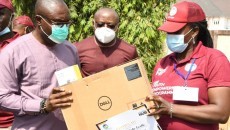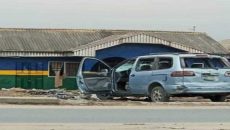Benson Igbakpa, Commissioner for Transport, Delta State, says there had been radical changes in transportation in the state since 1999. He speaks on how the people have benefited from the state’s transport policy and how the policy has become the envy of all
How would you describe the state of transportation in Delta State from 1999, when democracy took off till date?
The pre-1999 days, generally, were an era of anything goes. But the post-1999 era brought a lot of changes with government’s involvement in transportation, and this is not just about provision of buses, construction of roads, bridges and linkage between communities. But I would say that 2007 till date actually brought about a very radical change to transportation in Delta State. Apart from the construction of infrastructure to support transport, the present administration did a lot in the construction of jetties, roads and bridges. The government went into what I would call a functional public/private partnership in transportation. That way, the government became the first risk-taker by undertaking the purchase of buses and boats. Today in Nigeria, I will beat my chest and say it anywhere that Delta State parades the cheapest transport fare, irrespective of the fact that you have to travel in style and comfort. You pay very little because the government subsidises whatever you are paying. You pay a part of it and at the end of the month the government brings the other part and pays the operators.
So, when I say functional public/private partnership, the government owns the equipment, buses and boats. The private companies run them and make returns to government on monthly basis. And, in line with that, no transporter has the right to raise transport fares. We control the fare because the equipment belongs to us. You didn’t buy it. From day one, you are making profit so the government regulates the price. If people are not coming to patronise you there’s no way you can raise the price. So what we have done is to crash the price of transportation in Delta State by fixing the price. Even the private operators, those people that own their vehicles, they cannot raise their price; they cannot because there is a better bus, an air-conditioned bus, a very new bus that is ready to take the passengers so all you need do is just to comply with what the government has given out and that has actually affected the price and transport business in Delta State.
Having gone round the state, we saw quite a number of long buses, mini buses, taxis and tricycles on the roads as well as boats in the waterways. Can we have an idea of how many of each of these the government has been able to procure overtime?
For the mini buses, we have a total of 805 as I’m talking to you. For the long ones – the Marcopolo buses – we have 50 of them. Then there’s another brand we bought, the Nigerian-made Innoson buses. They are high occupancy vehicles too; we have 30 of those ones. For the tricycles, we have procured close to 4,000, and they are subsidised. The good thing about Delta State is that when we were to ban the use of motorcycles in some parts of Delta State, people said it would lead to increase in crime, but the governor, like Nostradamus, actually had the tricycle in place before thinking of the ban. And we gave them the tricycle to sell to themselves; they sold to themselves, collected the money, and just remitted certain percentage to government – highly subsidised, about N150,000 for the initial ones. Then for our boats, we got 150 water buses, 100 high-capacity 22-seater and 30 eight-seater. That’s the quantity we have now.
And, apart from that, because a lot is being done in the education sector, the government, apart from building the schools, gave out 40 buses to these schools and in this 2014 budget, we are trying to provide more school buses, about 120, one per school, to cater for some selected schools. This is not to talk of the ones we are doing with the security agencies, because you must give them that enabling environment for them to perform. The government has on about four occasions now, donated pick-ups, APCs, to support the police, army and even the other paramilitary units like customs, Federal Road Safety Commission, FRSC, and the Civil Defence Corps. There was a time we gave out 76 vehicles, another time we distributed 50, apart from the smaller ones like the five we gave to FRSC, five to customs and Civil Defence.
But there seems to be very few taxis on the streets of Delta, especially Asaba. Is it deliberate?
It’s deliberate. Because when you are talking about mass transit scheme, when you are talking about public transportation, even the buses, the high occupancy buses, the 50-seater do not really account for what the Western world would look at as mass transit. When you talk of mass transit you are looking at rail, something that can pick, not just two, three or 20 people; something that can take a whole lot like 100, 200 persons moving at the same time. That is why we have now ventured into the Bus Rapid Transit, BRT, in Warri that will give fives minute headway. Every five minutes you can be sure that a bus will be available at the bus stop for boarding. The BRT in Warri is actually a 15.5 kilometres range, with 70 buses plying it. You know, when His Excellency assumed office in 2007, he bought 170 taxis that were shared among the drivers; but a lot of persons converted it to private cars. They took them, changed the colours and within a short time, a lot of them were no longer on the streets. So, His Excellency decided to go for buses. If you can change cars to private use, let’s see how you can change the buses to personal use. So, he came out with buses and that worked. This brought about the Marcopolo and Innoson buses and the BRT concept. But apart from that, for our boats we have about 30 jetties because you cannot bring world-class boats and run on rickety community jetties, so we built concrete jetties, about 30 of them, with Koko as the star jetty. The jetty in Koko is a marvel; it’s like an airport. You have seats there where you can wait for the boat before it comes, one shade on this side, another on the other side. It’s a twin waiting shade jetty. We did that. For the buses, you can see the bus stops dotting all over the place and we are still doing more. The initial one was 30 for mini terminal. The mini terminals can take about four buses at a time. It’s not a bus stop but it’s a place where about two, three buses can converge at a time, while they move out one after the other. Then in Warri and Asaba now, we are constructing the mega bus terminal where, at the end of the day, you can park your vehicle, service it, refuel, wash it, because there’s a service point and there are offices where people can also check their vehicles like the thermometer. If you say you are running within the city, we should know how many times you do so. We are also working on getting an AFC (automatic fare collection) to deal with that, because we have to improve along the line with the present situation of what is happening in the modern world.
Maintenance has often been a challenge in schemes as yours. What measures are in place to ensure that the vehicles don’t go off the road before long?
If you have been following our transport scheme, the urban mass transit scheme, like I said, is a functional public/private partnership. With all sense of responsibility, government has not been a good businessman. But now, what we do is that we get these buses and say, company A, you have this 10, manage it; company B, you have this, and we do a formal agreement with you, including maintenance agreement. If at the end of the day you don’t maintain the vehicle and I see that the vehicle is not looking good, I will halt your driver and we will retrieve the vehicle; and we have been doing this. You will have to come explain to me why the vehicle is in such condition and I will give you a time frame to go and fix it. If you don’t fix it, there are a thousand and one people that need this support. So if you fail in your agreement, we take it back from you, give it to a willing operator and you don’t get a dime as a refund because it is government’s property.
Delta Line, you could say, is a kind of flagship medium for the state and it’s very popular means of transport for people of the state. What effort or support has the government provided to the agency to boost its capacity?
When I assumed duty as commissioner for transport, one of the things I noticed was that Delta Line had a lot of vehicles that had broken down. The revelation was not good enough. Like I told you, once you bring government into business, it doesn’t work. The company was over-staffed. It was given 160 buses and 70 cars to manage for which they were not expected to pay back. But even without paying back, they could not maintain them. As at the time I resumed, out of the 160 buses, they had 120 left; that’s within the year. And I remember asking the managers in my first meeting with them. If in a year, 40 buses are gone from the collection, tell me how many years you need to run the company aground. They were looking at me and I was so angry and demanded that they answered the question. And they answered that in four years, the company would go under. And I said okay, since we don’t want it to go under, it’s our flagship like you said, it’s an identity; His Excellency in his usual manner, approved that I should give them another 20 vehicles, but these 20, they needed to pay back like others are doing because other people are bringing their money.
The last 100 vehicles we procured, it was the payback money that we used in paying for them. If everybody is bringing money and you are not bringing and we keep giving you, it’s like putting the money down the drain. That is why, in the last commissioning that the governor did, he said it openly that he was not going to give the company any bus because those in charge have not showed any responsibility for him to continue giving them. They’ve not really been good in their operation. They have issues with management, they have issues with corruption and they have issues with knowing what to do. I must take some blame too because the buck stops on my table. I believe something drastic must be done to restructure Delta Line to give us the Delta Line of our dream. But it’s sad that the one that belongs to government is actually the one that is failing us.
Follow Us on Social Media




 WhatsApp us
WhatsApp us